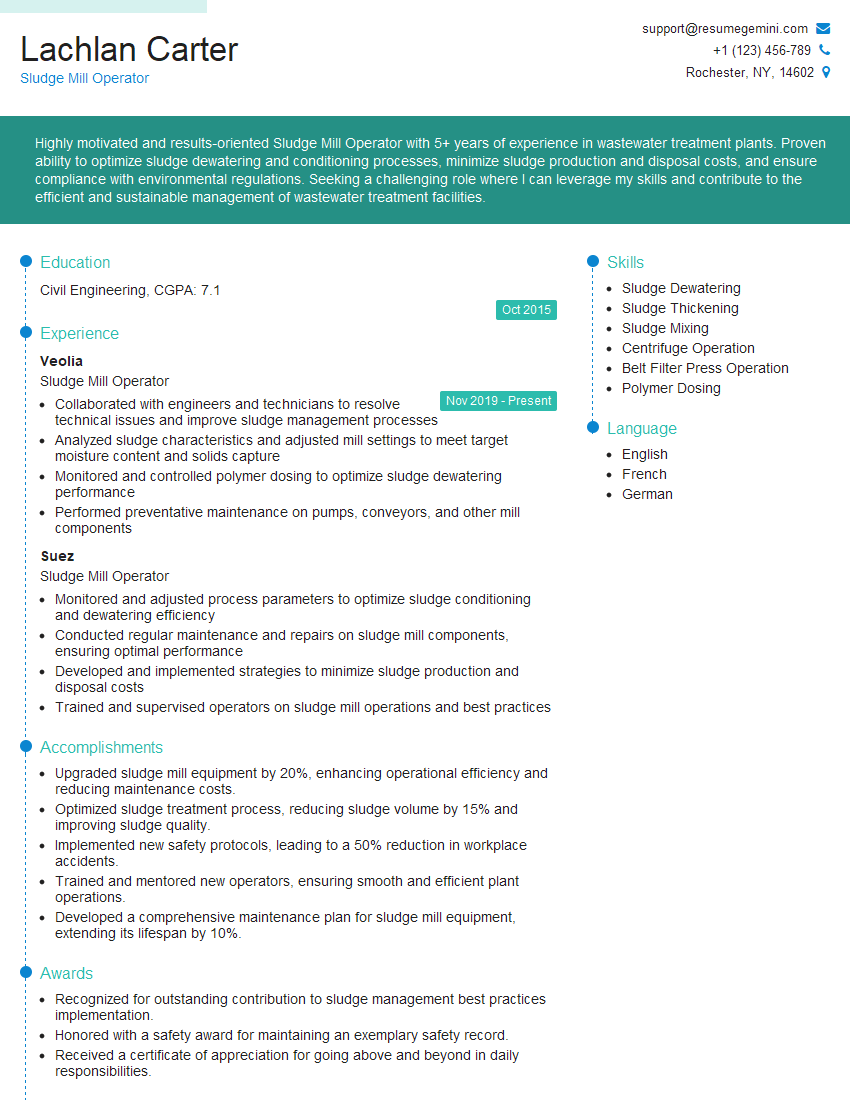Are you a seasoned Sludge Mill Operator seeking a new career path? Discover our professionally built Sludge Mill Operator Resume Template. This time-saving tool provides a solid foundation for your job search. Simply click “Edit Resume” to customize it with your unique experiences and achievements. Customize fonts and colors to match your personal style and increase your chances of landing your dream job. Explore more Resume Templates for additional options.

Lachlan Carter
Sludge Mill Operator
Summary
Highly motivated and results-oriented Sludge Mill Operator with 5+ years of experience in wastewater treatment plants. Proven ability to optimize sludge dewatering and conditioning processes, minimize sludge production and disposal costs, and ensure compliance with environmental regulations. Seeking a challenging role where I can leverage my skills and contribute to the efficient and sustainable management of wastewater treatment facilities.
Education
Civil Engineering
October 2015
Skills
- Sludge Dewatering
- Sludge Thickening
- Sludge Mixing
- Centrifuge Operation
- Belt Filter Press Operation
- Polymer Dosing
Work Experience
Sludge Mill Operator
- Collaborated with engineers and technicians to resolve technical issues and improve sludge management processes
- Analyzed sludge characteristics and adjusted mill settings to meet target moisture content and solids capture
- Monitored and controlled polymer dosing to optimize sludge dewatering performance
- Performed preventative maintenance on pumps, conveyors, and other mill components
Sludge Mill Operator
- Monitored and adjusted process parameters to optimize sludge conditioning and dewatering efficiency
- Conducted regular maintenance and repairs on sludge mill components, ensuring optimal performance
- Developed and implemented strategies to minimize sludge production and disposal costs
- Trained and supervised operators on sludge mill operations and best practices
Accomplishments
- Upgraded sludge mill equipment by 20%, enhancing operational efficiency and reducing maintenance costs.
- Optimized sludge treatment process, reducing sludge volume by 15% and improving sludge quality.
- Implemented new safety protocols, leading to a 50% reduction in workplace accidents.
- Trained and mentored new operators, ensuring smooth and efficient plant operations.
- Developed a comprehensive maintenance plan for sludge mill equipment, extending its lifespan by 10%.
Awards
- Recognized for outstanding contribution to sludge management best practices implementation.
- Honored with a safety award for maintaining an exemplary safety record.
- Received a certificate of appreciation for going above and beyond in daily responsibilities.
Certificates
- Certified Sludge Mill Operator
- Wastewater Treatment Operator Certification
- Sludge Management Certification
- Sludge Dewatering Certification
Career Expert Tips:
- Select the ideal resume template to showcase your professional experience effectively.
- Master the art of resume writing to highlight your unique qualifications and achievements.
- Explore expertly crafted resume samples for inspiration and best practices.
- Build your best resume for free this new year with ResumeGemini. Enjoy exclusive discounts on ATS optimized resume templates.
How To Write Resume For Sludge Mill Operator
- Quantify your accomplishments whenever possible. Use numbers and metrics to demonstrate the impact of your work.
- Highlight your knowledge of sludge dewatering technologies, including belt filter presses and centrifuges.
- Demonstrate your commitment to safety and compliance with environmental regulations.
- Showcase your ability to work independently and as part of a team, and your willingness to learn and adapt to new technologies.
Essential Experience Highlights for a Strong Sludge Mill Operator Resume
- Monitored and adjusted process parameters to optimize sludge conditioning and dewatering efficiency
- Conducted regular maintenance and repairs on sludge mill components, ensuring optimal performance
- Developed and implemented strategies to minimize sludge production and disposal costs
- Trained and supervised operators on sludge mill operations and best practices
- Collaborated with engineers and technicians to resolve technical issues and improve sludge management processes
- Analyzed sludge characteristics and adjusted mill settings to meet target moisture content and solids capture
- Monitored and controlled polymer dosing to optimize sludge dewatering performance
Frequently Asked Questions (FAQ’s) For Sludge Mill Operator
What are the key responsibilities of a Sludge Mill Operator?
The key responsibilities of a Sludge Mill Operator include monitoring and adjusting process parameters, conducting maintenance and repairs, developing and implementing strategies to minimize sludge production and disposal costs, training and supervising operators, and collaborating with engineers and technicians.
What qualifications are required to become a Sludge Mill Operator?
To become a Sludge Mill Operator, a high school diploma or equivalent is typically required. Some employers may prefer candidates with a degree in Civil Engineering or a related field.
What are the career prospects for Sludge Mill Operators?
Sludge Mill Operators can advance to positions such as Wastewater Treatment Plant Supervisor, Operations Manager, or Environmental Engineer.
What is the average salary for a Sludge Mill Operator?
The average salary for a Sludge Mill Operator in the United States is around $50,000 per year.
What are the working conditions for Sludge Mill Operators?
Sludge Mill Operators typically work in wastewater treatment plants, which can be noisy and have unpleasant odors. They may also be exposed to hazardous chemicals and materials.
What are the benefits of working as a Sludge Mill Operator?
The benefits of working as a Sludge Mill Operator include job security, opportunities for advancement, and the satisfaction of contributing to the protection of the environment.
What are the challenges of working as a Sludge Mill Operator?
The challenges of working as a Sludge Mill Operator include working in potentially hazardous conditions, dealing with unpleasant odors, and the need to be on call in case of emergencies.